Department Profile

The Department of Computer Science and
Engineering was established in 1999 and offers a four-year Bachelor of Engineering program
in Computer Science and Engineering, affiliated to Visvesvaraya Technological University,
approved by AICTE, and accredited with NBA Certification. With a mission to create a center
of excellence, the department focuses on providing students with a strong foundation in
Computer Science and Engineering, programming, and problem-solving, coupled with exposure to
emerging technologies The curriculum addresses both theoretical and practical aspects;
ensuring students are well-prepared to meet industry demands.
It is recognized as a VTU Research center for pursuing a PhD. The department encourages research and innovation. The department's expertise spans Computer Networks, Cloud Computing, and Data Mining. Faculty members actively contribute to research papers, publications, and patents, enriching the academic atmosphere and providing students with exposure to cutting-edge developments.
In addition to academic excellence, the department has state-of-the-art lab facilities, including the Database Management Systems Lab, Design Analysis and Algorithms Lab, Analog and Digital Electronics Lab, Microcontroller and Embedded Systems Lab, System Software Lab, Computer Networks Lab focusing on networking challenges, Mobile Application Development Lab, Computer Graphics Lab, AI/ML Lab, Cyber security Lab, and a Project Lab. Graduates from the program have achieved remarkable success in placements at prestigious companies like ORACLE India Pvt. Ltd., Infosys, and Accenture.
HoD Message
Dear Students,
The Department of Computer Science and Engineering was established in 1999 and offers a four-year Bachelor of Engineering program in Computer Science and Engineering, affiliated to Visvesvaraya Technological University, approved by AICTE, and accredited with NBA Certification.
With a mission to create a centre of excellence, the department focuses on providing students with a strong foundation in Computer Science and Engineering, programming, and problem-solving, coupled with exposure to emerging technologies The curriculum addresses both theoretical and practical aspects; ensuring students are well-prepared to meet industry demands.
It is recognized as a VTU Research center for pursuing a PhD. The department encourages research and innovation. The department's expertise spans Computer Networks, Cloud Computing, and Data Mining. Faculty members actively contribute to research papers, publications, and patents, enriching the academic atmosphere and providing students with exposure to cutting-edge developments.

Dr. I. Manimozhi
East Point College of Engineering and Technology
In addition to academic excellence, the department has state-of-the-art lab facilities, including the Database Management Systems Lab, Design Analysis and Algorithms Lab, Analog and Digital Electronics Lab, Microcontroller and Embedded Systems Lab, System Software Lab, Computer Networks Lab focusing on networking challenges, Mobile Application Development Lab, Computer Graphics Lab, AI/ML Lab, Cyber security Lab, and a Project Lab. Graduates from the program have achieved remarkable success in placements at prestigious companies like ORACLE India Pvt. Ltd., Infosys, and Accenture.
Join us in shaping your future in the field of Computer Science and Engineering, creating a brighter tomorrow filled with endless possibilities.
Laboratories

Database Management System Lab
Database Management Systems Lab :- The DBMS Laboratory course at our institution provides students with valuable hands-on experience in various aspects of database design, development, implementation, analysis, and evaluation/testing. This comprehensive curriculum covers a wide range of topics, including the asymptotic performance of algorithms, the practical application of linear data structures like stacks, queues, and lists, as well as the utilization of non-linear data structures such as trees and graphs. Additionally, students gain proficiency in sorting and searching algorithms, equipping them with essential skills for managing and optimizing databases in real-world scenarios. Through this course, students develop a strong foundation in database management and problem-solving, preparing them for future challenges in the field.
Design Analysis and Algorithms Lab :- The DAA Lab is a crucial component of our curriculum, designed to empower students with essential skills and knowledge in database concepts, technology, and practical application. This lab serves as a foundation for aspiring database application developers, providing them with comprehensive insights into the field. Through hands-on practice in SQL programming, students tackle a range of database problems, honing their abilities to manipulate and manage data effectively. Moreover, this lab equips students with the expertise to develop database applications using both front-end tools and back-end Database Management Systems (DBMS), ensuring they are well-prepared for the demands of the ever-evolving world of database technology and practice.
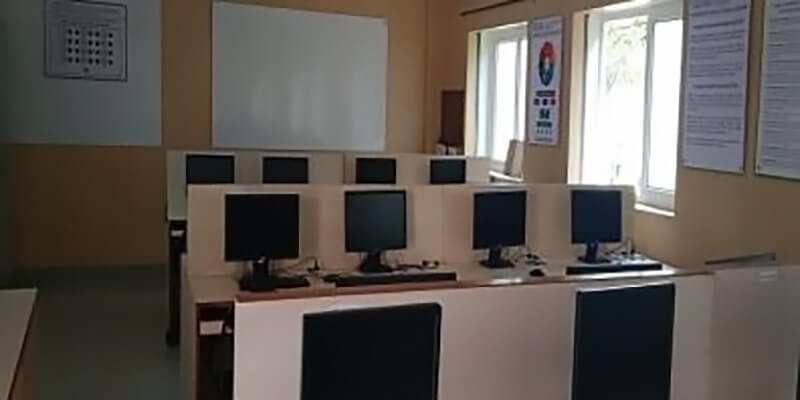
Data Structures and Algorithms Lab
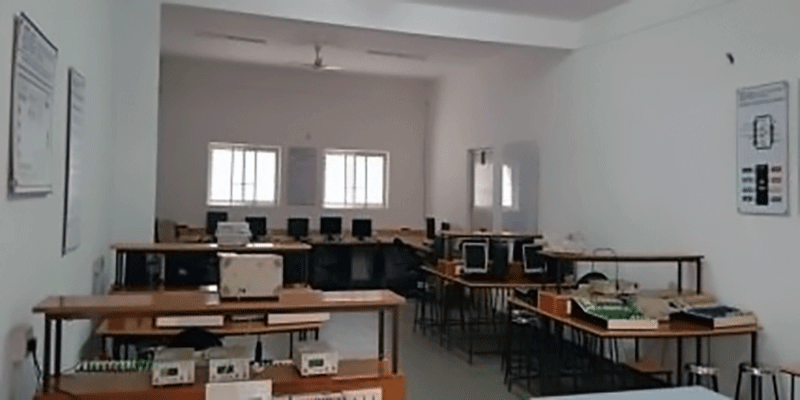
Analog and Digital Electronics Lab
Analog and Digital Electronics Lab :- In Analog and Digital Electronics lab, students can gain the knowledge of designing analog and digital electronic circuits, which they can understanding the hardware and simulation. The students can understand the photo electronics devices, 555 timer IC, Regulator ICs and uA741. The students can make use of simplifying techniques in the design of combinational circuits. The students can illustrate combinational and sequential digital circuits and demonstrate the use of flipflops and apply for registers. They can design and test counters, Analog-to-Digital and Digital-to-Analog conversion techniques. They can gain knowledge of simulation tools such as PSPICE, Xilinx and Modelsim.
Microcontroller and Embedded Systems Lab :- In MCES lab, the students can understand the fundamentals of ARM-based systems, including programming modules with registers and the CPSR. They can use the various instructions to program the ARM controller. They can do program various embedded components using the embedded C program. They can Identify various components, their purpose, and their application to the embedded system's applicability. They can understand the embedded system's real-time operating system and its application in IoT. Students can understand the hardware architecture of ARMLPC2148 and they can gain the knowledge the how input and output devices will be interfaced in to microcontroller. They can demonstrate the real time embedded IOT projects and they can exhibit their innovative ideas.
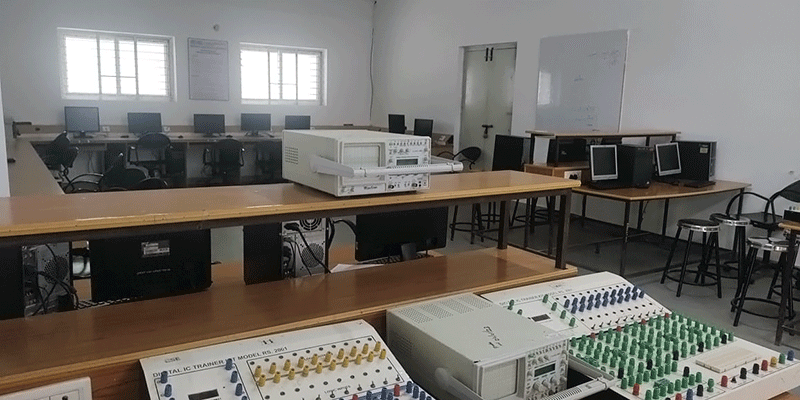
Microcontroller and Embedded Systems Lab
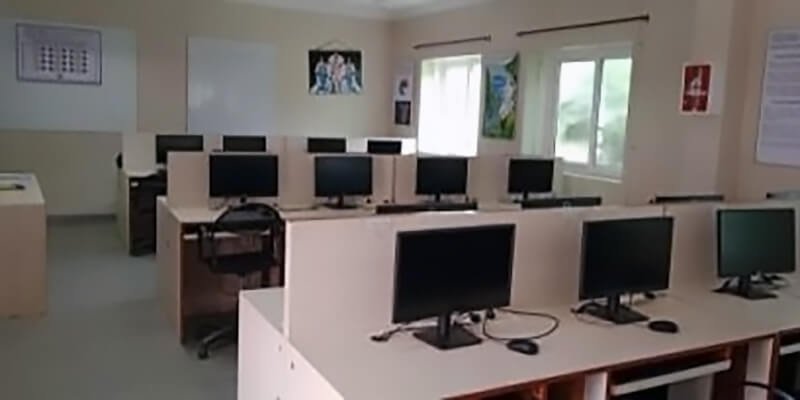
System Software Lab
System Software Lab :- The System Software Lab is a dynamic and essential component of our computer science curriculum, providing students with invaluable hands-on experience in the intricate world of system software development. In this lab, students immerse themselves in the creation of compilers by implementing each phase of the compilation process. They start with lexical analysis, employing the Lex tool to tokenize source code, and then proceed to syntax analysis using Yacc and C compiler for parsing. Students also gain practical insight into constructing parsing tables and generating intermediate code. Beyond compiler design, the lab extends its purview to core operating system concepts, such as various scheduling algorithms, the Banker's algorithm, and page replacement algorithms. Through these diverse activities, students not only acquire the technical skills needed to develop system software but also comprehend its paramount significance in the realm of computer science.
Computer Networks Lab :- In a networking lab, students can gain knowledge in building networking programs in Java through a combination of theoretical understanding and practical experience. Simulation plays a crucial role in enhancing students' understanding of complex network concepts. Through network simulation software like Cisco Packet Tracer or NS2, students can create virtual network environments to experiment, test configurations, and observe network behavior without the need for physical hardware. This hands-on approach allows students to grasp routing, switching, and network design principles in a safe and controlled setting. It also fosters problem-solving skills as they troubleshoot simulated network issues, making them better prepared for real-world networking challenges.
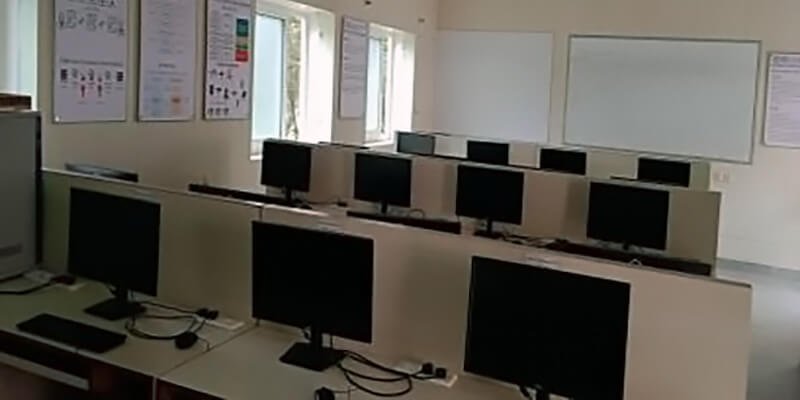
Computer Networks Lab
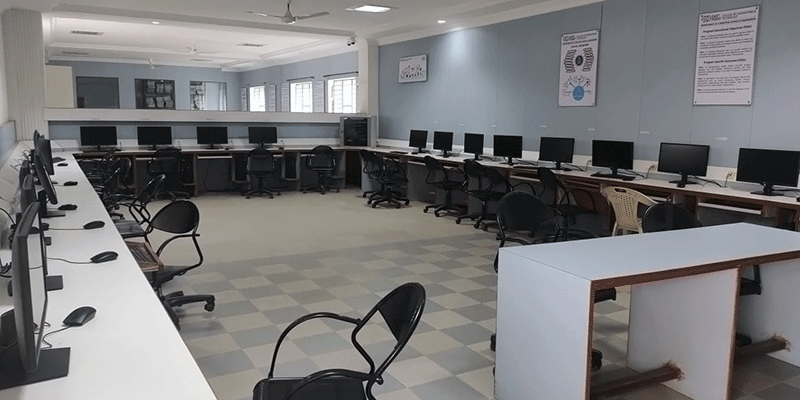
Mobile Application Development Lab
Mobile Application Development Lab :- The Mobile Application Development Lab aims to equip students with a comprehensive skill set in Android programming. Students will learn the intricacies of Android app development, including configuring Android Studio for application deployment. They will gain a deep understanding of Android's user interface functionalities, enabling them to design user-friendly and visually appealing applications. Additionally, students will learn to create, modify, and query SQLite databases, a fundamental aspect of Android app data management. The lab also delves into the implementation of various data sharing methods using services, providing students with a holistic understanding of Android app development, from UI design to efficient data handling.
Computer Graphics Lab :- Computer graphics lab aims to understand different concepts of graphics. The students can gain knowledge in all aspects of creating images, coordinate systems, understanding the concepts of 3D coordinate systems, transformations and clipping. The CGV labs are equipped with state-of-the-art hardware and software courses including high-performance computers and various models and visualization. Through this lab students will be able to develop various models of 2D & 3D design applications and visualize the same.
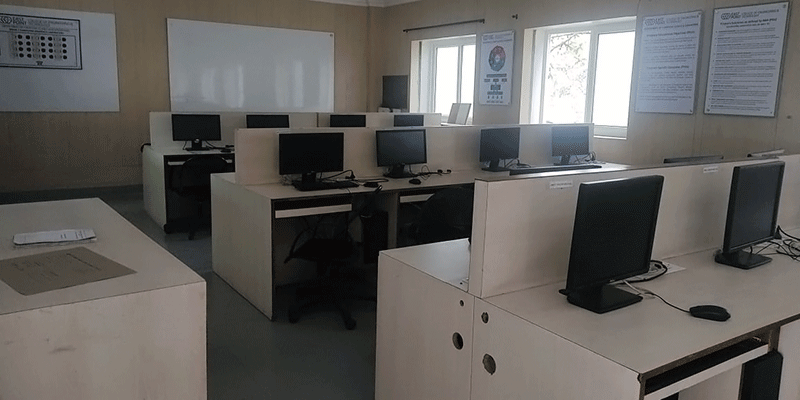
Computer Graphics Lab
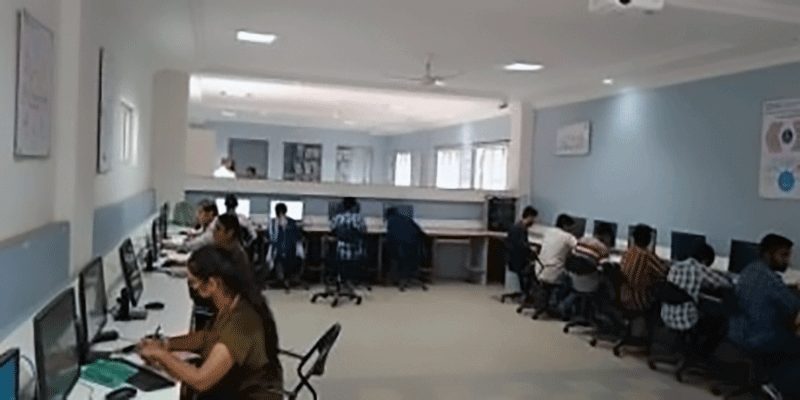
Artificial Intelligence and Machine Learning Lab
AI/ML Lab :- The AI/ML Lab helps students to gain knowledge in building AI and ML based tools and technologies. The lab focuses on developing AI / ML algorithms, models and techniques. This involves designing and testing approaches to solve complex problems and improve the existing systems. The lab often aims in developing practical applications and solutions using Ai/ML technologies. These applications can have a wide range of uses, from healthcare and finance to autonomous systems and natural language processing. The AI/ML Lab experiments are implemented in Python.
Cybersecurity – Centre of Excellence :- To offer students a solid mixture of experts with knowledge of both general and technical aspects of Cyber Security. The centre focuses on interdisciplinary connections with Mathematics, Computer Science, and Communication as research and training in all theoretical and applied aspects of Cyber Security. This lab helps students to help in carrying out projects in the area of privacy and Cyber Security.

Cybersecurity – Centre of Excellence
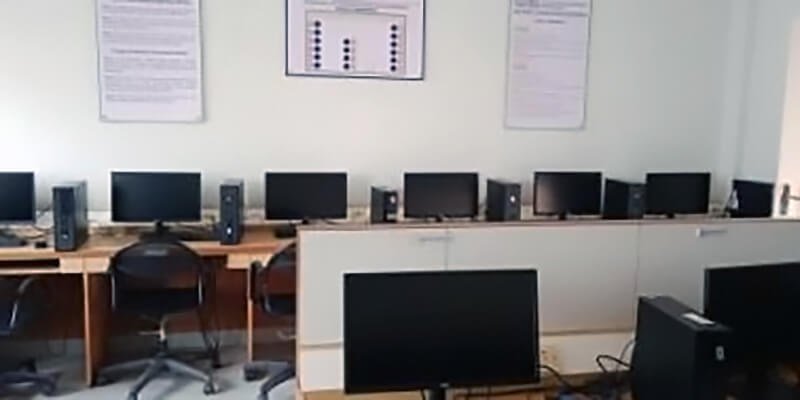
Project Lab
Project Lab :- The Project Lab is the dynamic hub where innovation meets practical application, fostering an environment where students transform their theoretical knowledge into tangible, real-world solutions. The lab is outfitted with cutting-edge technology to meet the demands of designing and developing projects in areas such as networking, Artificial Intelligence, machine learning, image processing, mobile app development, IOT-based, and so on. The Project Lab offers a space where students can conceptualize, plan, and execute their ideas. It's a place where students bring their visions to life, learning crucial project management skills, honing their teamwork abilities, and gaining invaluable experience that prepares them for the challenges of the professional world.
Program Overview
The department's mission is to equip students with strong fundamentals in Computer Science and Engineering, emphasizing both theory and practical skills in computation, programming, and emerging technologies. Students cover various subjects including programming languages, algorithms, databases, and artificial intelligence, enabling them to excel in roles like software developers, hardware engineers, and analysts upon course completion.
Program Specific Outcomes
- To conceptualize, model, design, simulate, analyse, develop, test, and validate computing systems and solve technical problems arising in the field of Computer Science & Engineering.
- To specialize in the sub-areas of Computer Science and Engineering such as Cloud Computing, Robotic Process Automation, Cyber Security, Big data Analytics, User Interface Design and IOT to meet industry requirements.
- To build innovative solutions to meet the demands of the industry using appropriate tools and techniques.
Program Outcomes
- Engineering knowledge :- Apply the knowledge of mathematics, science, engineering fundamentals, and an engineering specialization to the solution of complex engineering problems.
- Problem analysis :- Identify, formulate, review research literature, and analyse complex engineering problems reaching substantiated conclusions using first principles of mathematics, natural sciences, and engineering sciences.
- Design/development of solutions :- Design solutions for complex engineering problems and design system components or processes that meet the specified needs with appropriate consideration for the public health and safety, and the cultural, societal, and environmental considerations.
- Conduct investigations of complex problems :- Use research-based knowledge and research methods including design of experiments, analysis and interpretation of data, and synthesis of the information to provide valid conclusions.
- Modern tool usage :- Create, select, and apply appropriate techniques, resources, and modern engineering and IT tools including prediction and modelling to complex engineering activities with an understanding of the limitations.
- The engineer and society :- Apply reasoning informed by the contextual knowledge to assess societal, health, safety, legal and cultural issues and the consequent responsibilities relevant to the professional engineering practice.
- Environment and sustainability :- Understand the impact of the professional engineering solutions in societal and environmental contexts, and demonstrate the knowledge of, and need for sustainable development.
- Ethics :- Apply ethical principles and commit to professional ethics and responsibilities and norms of the engineering practice.
- Individual and team work :- Function effectively as an individual, and as a member or leader in diverse teams, and in multidisciplinary settings.
- Communication :- Communicate effectively on complex engineering activities with the engineering community and with society at large, such as, being able to comprehend and write effective reports and design documentation, make effective presentations, and give and receive clear instructions.
- Project management and finance :- Demonstrate knowledge and understanding of the Engineering and management principles and apply these to one’s own work, as a member and leader in a team, to manage projects and in multidisciplinary environments.
- Life -long learning :- Recognize the need for and have the preparation and ability to engage in independent and life -long learning in the broadest context of technological change.
Program Educational Objectives (PEOs)
- PEO 1. A Civil engineer who is technically competent and acquired knowledge in civil engineering domain to meet the industry requirement and solve societal problems. & Engineering.
- PEO 2. A civil engineer who is effective communicator, demonstrate leadership,innovation and entrepreneurship skills to find cost effective sustainable solution. Interface Design and IOT to meet industry requirements.

